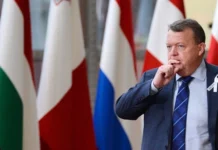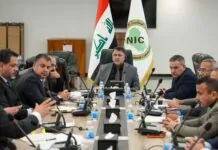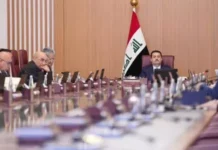Tishwash: Trade Bank of Iraq launches direct delivery service for electronic cards.
The Trade Bank of Iraq announced today, Thursday, the launch of a direct delivery service for electronic cards.
A statement from the bank, received by Al-Eqtisad News, stated that “to facilitate customers, it has been decided to activate the direct delivery service for electronic cards.”
The bank added, “We announce the activation of the electronic card delivery service in Baghdad and all governorates to ensure their safe and timely arrival.” link
Tishwash: Indonesian Ambassador: Invites Karbala merchants to participate in a trade fair in his country
The Indonesian Ambassador to Iraq, Didik Eko Pujianto, invited merchants from the holy Karbala Governorate to participate in a trade fair to be held in his country next month, stressing his country’s desire to invest in Iraq and Karbala in the fields of medicine, leather industries, electricity, and other projects.
The Indonesian ambassador told Al-Mustaqilla on the sidelines of his visit to the Karbala Chamber of Commerce and his meeting with the chamber’s president, Zaman Sahib Abdul Awad, “We discussed strengthening and deepening bilateral relations between the two countries, opening new horizons for joint cooperation to stimulate trade exchange, and we are working to facilitate procedures for obtaining entry visas.”
For his part, the head of the Karbala Chamber of Commerce said in a statement to Al-Mustaqilla after his meeting with the Indonesian ambassador, “We invited Indonesian traders, companies and businessmen to see and learn about the most important investment opportunities in the province.”
In addition, the Chamber’s Vice President, Saeed Shukr, emphasized to the Indonesian Ambassador the importance of reviewing the Iraqi investment law to benefit from it, and to encourage Indonesian companies to establish projects, especially medical projects, to be of a standard befitting the quality of the holy Karbala Governorate, and the necessity of these companies obtaining approvals from the Iraqi Ministry of Health.
Chamber Board Member Mohammed Al-Hussaini concluded by stressing the need for Indonesian companies to visit Karbala Governorate and see for themselves the investment opportunities.
The delegation called for “facilitating the issuance of entry visas to Karbala merchants, as this would have a positive impact on strengthening and deepening economic relations.” link
************
Tishwash: Parliament on the brink of closure: MPs’ salaries exceed 400 billion dinars
The Council has been inactive for 14 months… and Al-Mashhadani was looking for a “religious fatwa”!
MPs are estimated to have received more than 122 billion dinars in wages, salaries, and services during this current session, “without work” due to the suspension of sessions.
Parliament failed to hold more than 100 sessions during its fifth session, including only 12 sessions during the past 11 months.
Based on this poor performance, it is likely that September will be the last day of the parliament’s term, which is supposed to extend its term until early 2026.
Last Tuesday, parliament failed to hold its session for the second time in the same week due to a lack of quorum.
Yasser al-Husseini, an independent MP, told Al-Mada, “Political disagreements over important laws led to the suspension,” including a law related to Saudi investments in Iraq.
Al-Husseini asserted that “most MPs are busy preparing for the elections,” scheduled for November 11. statement issued after a presidential meeting in parliament last Tuesday described MPs’ attendance at sessions as “a national duty that cannot be postponed,” following the failure of the last two sessions.
The statement, following a meeting between Parliament Speaker Mahmoud al-Mashhadani and his deputies, Mohsen al-Mandalawi and Shakhwan Abdullah, emphasized “the importance of the presence of parliamentary bloc heads and MPs at the upcoming sessions and their active participation in voting on vital laws.”
Parliament published the agenda for the sessions of Monday and Tuesday earlier this week, which included a number of laws described as important.
In a video address, Deputy Speaker Shakhwan Abdullah expressed his regret over the lack of a quorum for the parliamentary session last Tuesday, despite the presence of important laws and legislation on the agenda.
He added that no more than 50 MPs were present, despite the 130 MPs who signed the attendance list. He explained that this was unacceptable, given that many MPs travel from outside Baghdad to attend the sessions.
Full salaries, no cuts!
Last August, Parliament imposed fines on MPs who miss sessions, deducting one million dinars from the salary of each MP absent from a single session. The number of absentees ranged between 100 and 150 MPs per session.
However, it appears that MPs have found a way around this punishment, sitting in the parliament cafeteria without attending sessions, thus avoiding salary cuts.
Mohammed al-Ziyadi, a representative of the Muntasiroun bloc, affiliated with Kata’ib Sayyid al-Shuhada leader Abu Alaa al-Wala’i, told Al-Mada: “We are not school students… MPs can express their opinion by boycotting and not attending sessions, but what matters is that they attend parliament.”
In the past, al-Mashhadani, the last parliament speaker, hesitated to cut the salaries of absent MPs, although he said in March 2025 that he was seeking a “fatwa from the Najaf Martyrdom” regarding MPs’ attendance at sessions, describing the current session as “the worst.”
MPs like Yasser al-Husseini believe that “dismissing the absent MP,” rather than simply cutting their salaries, will prevent others from being absent, explaining that “constitutionally, parliament’s term is supposed to end on January 8, 2026.”
The parliamentary term consists of four legislative years, each of which is divided into two terms, each extending for eight months, with a four-month recess.
This parliament was suspended for three months after the elections, and has two presidents since the removal of former President Mohammed al-Halbousi at the end of 2023.
So far, since its first session on January 9, 2022, the current parliament has only been able to hold 149 sessions out of approximately 265.
This means that parliament has not functioned for 14 months, but during that period, it has received full salaries and expenses amounting to more than “122 billion and 500 million dinars.”
According to some reports, each member of parliament receives a monthly salary of 8 million dinars, in addition to 16 million dinars in protection allowances and 3 million dinars in rent allowances for members of parliament not residing in Baghdad, bringing the total monthly salary of each member of parliament to 27 million dinars.
The total annual cost of salaries and allowances for all 329 members of parliament amounts to more than 426 billion dinars.
“Hibernation Time”
Ghaleb Al-Dami, a political affairs researcher, says that “Parliament has now entered the winter hibernation phase.
” Al-Dami added to Al-Mada: “Most of the members of parliament are candidates and are busy campaigning in the governorates,” predicting that this September will be “the last day of parliament.”
The worst performance of the sessions this term occurred during the tenure of its current speaker, al-Mashhadani, who was only able to hold 12 sessions in 11 months, at a rate of one session per month instead of the usual eight.
For his part, Ziad al-Arar, an academic and researcher, said that “political disagreements between bloc leaders from all parties have brought parliamentary work to a near-standstill.”
He added to Al-Mada: “There are clear disagreements between Speaker al-Mashhadani and his deputy, al-Mandalawi, and the Sunni forces, as well as a lack of trust among the leaders of the political scene.”
Al-Arar pointed out that, due to these disagreements, the heads of the parliamentary blocs are “upset with each other and are not attending the sessions.”
The researcher believes that the origin of the disagreement was on the day al-Mashhadani was elected (late October 2024), due to objections to his assumption of the position.
His election was a “gracious response” to the parliament speaker’s previous positions with some political parties. link





